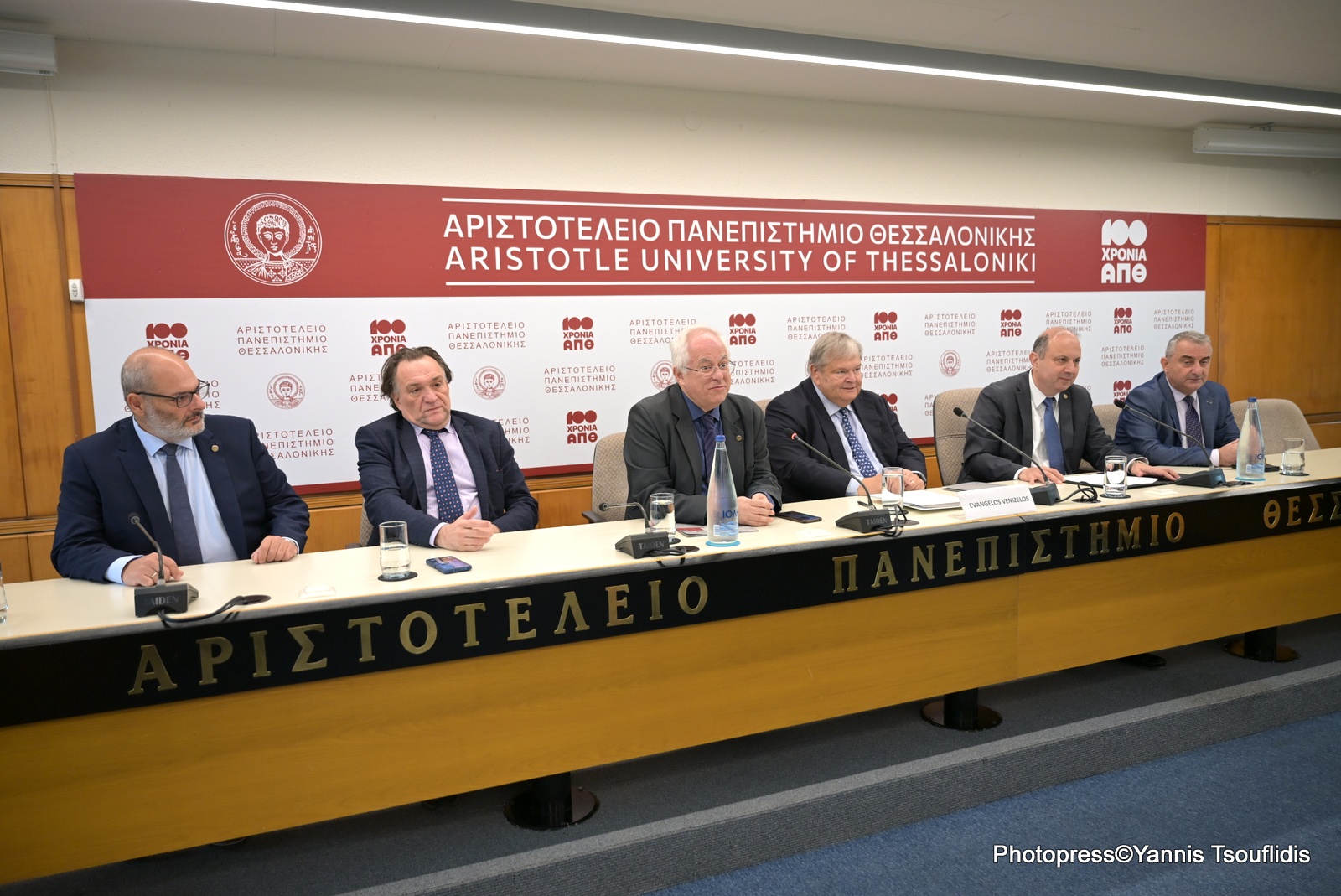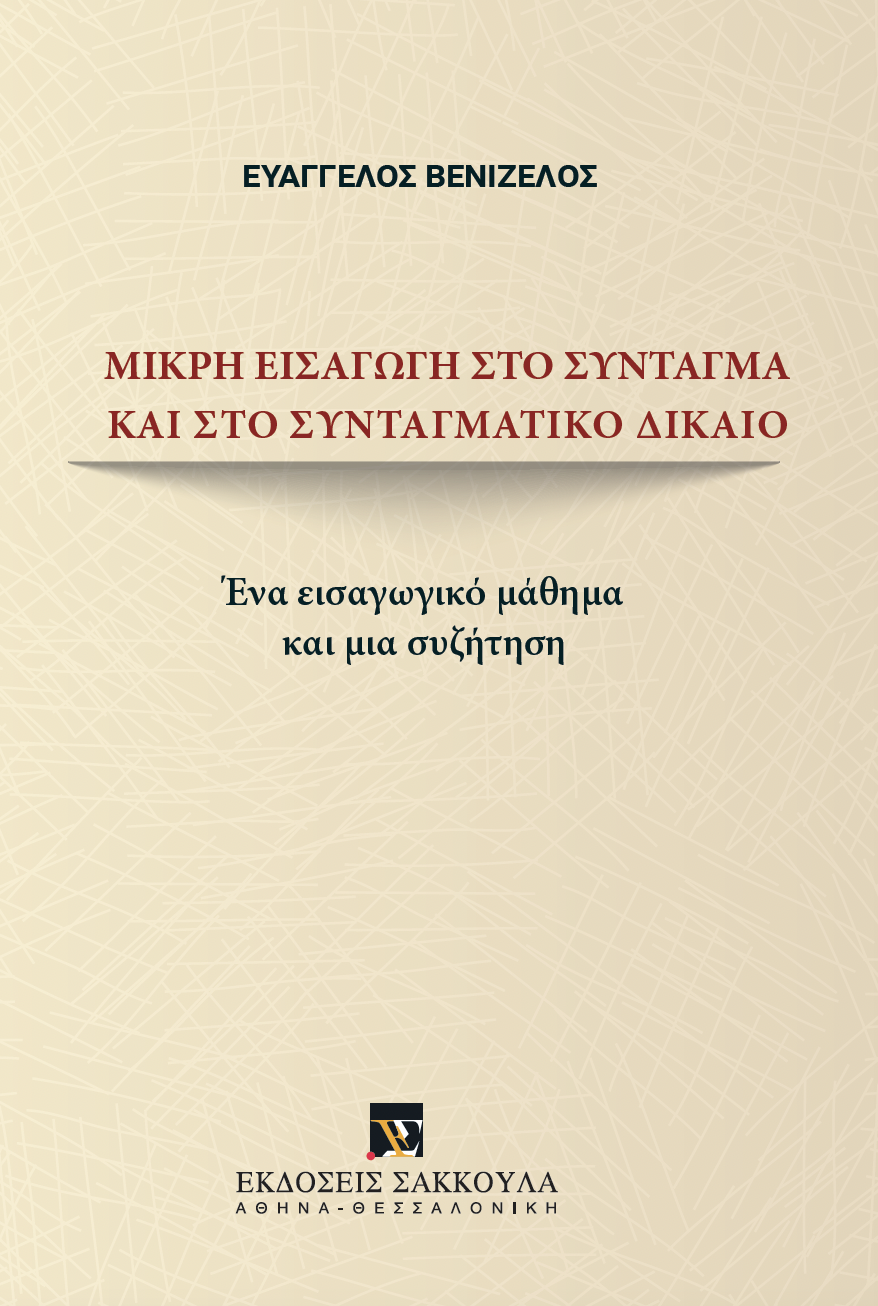Thessaloniki, 27.9.2025
Conference of the Law Schools from the Western Balkans and Moldοva
held at the Aristotle University of Thessaloniki from September 25-27, 2025
Deans’ Conference
Evangelos Venizelos, Key note speaker
Dear Colleagues,
I am delighted to welcome you here in Thessaloniki, my birthplace, my electoral district for 27 years, and especially in the Senate Hall of Aristotle University of Thessaloniki, my Alma Mater, where I served as Professor of Constitutional Law for more than forty years.
Since the background of the initiative of my dear friend Panagiotis Glavinis, Dean of the Law School and one of my distinguished former students, for academic cooperation among the law schools of the Western Balkans and Moldova is the prospect of these countries’ accession to the European Union, allow me to begin with a brief personal recollection.
I consider my involvement with the prospect of the Western Balkans’ accession to the European Union as an important chapter in my political career. I was honored, as President of the EU Council of Ministers, to chair in 2014 the first Intergovernmental Conferences launching the accession process of both Serbia and Albania. I was also pleased that, under my presidency, the Council of Ministers granted Albania candidate country status. Likewise, under my presidency, the Council of Ministers decided to waive the visa requirement for holders of Moldovan passports. The very next day I welcomed in Athens the then Prime Minister of Moldova, who arrived on the first flight without a visa.We are looking forward with keen interest to the outcome of tomorrow’s parliamentary elections, as the country’s European perspective depends to a significant extent on them.
A special mention is due to the effort made on both sides—already since the Interim Accord of 1995, in which I was personally involved—to ensure that the name dispute would cease to constitute an obstacle to North Macedonia’s accession to the EU.
Dear colleagues,
You are now taking the initiative to organize an impressive joint master’s program entitled “Law & Practice of the European Union’s External Relations” at a time when the West, as a unified strategic entity built on the Euro-Atlantic axis, is being tested. Within this context, the EU itself is being tested—mainly in the field of Common Foreign and Security Policy, but also in the realm of international economic and trade relations.
To be more specific, the two most important pillars of the West—at the same time the two great historic wagers of European integration—are now under strain.
First, the quality and resilience of liberal democracy: the institutional and historical combination of democracy and the rule of law, which constitute the value-based territory of the West. For the first time since World War II, a clear differentiation is emerging between American and European conceptions of liberal democracy, the level of protection of human rights, freedom of expression, tolerance toward political opponents, and cultural pluralism.
Second, the concept of security, primarily in its military sense, as external security—security defined by the perception of threats and enemies. The West was consolidated through NATO on the basis of a shared sense of Western security, with both a European and an American dimension. Today, this is no longer self-evident. The American administration assumes responsibility for Western leadership and guarantees European security under very strict conditions it imposes on European partners—political, military, and economic, including those concerning the transatlantic trade balance.
In today’s multipolar world, where the majority lies outside the West and beyond Western influence, each EU member state understandably has its own historical and geographical concerns and its own priorities regarding national security, the national economy, social cohesion, and the functioning of its political system. Yet all member states recognize that the new historical era we have entered requires the acceleration of European integration, in fields far beyond the single market, including own resources, joint debt issuance to finance vital programs, and—above all—European security and defense, which have now become existential priorities for the EU.
Of course, resistance in the name of national sovereignty exists and is deeply rooted in the perceptions of European societies. There are also substantive disagreements over crucial choices related to major international challenges—such as developments in the Middle East, especially Gaza, the war in Ukraine, attitudes toward Russia and China, and the conduct of the transatlantic dialogue.
At the same time, European democracy is haunted by fear due to the rise of the far right and political instability in major European countries. Nevertheless, acceleration and deepening of European integration constitute a historical necessity, recognized by the clear majority of member states and European political forces. This does not mean, however, that this will take the form of an explicit and ambitious revision of the founding Treaties, as such a procedure would most likely be blocked—at the latest—at the ratification stage, due to the provisions of member states’ constitutions.
The real question, therefore, is whether, at this historic juncture and in light of the challenge of European integration, the prospect of EU enlargement with the accession of the Western Balkans and Moldova remains open and viable. The EU perceives this region as an integral part of Europe and acknowledges that, beyond all other reasons, European security itself requires enlargement. Yet at the same time, the processes of European integration must also accelerate. The accession of new states, even small or medium-sized ones, must not impede the Union’s path toward deepening and completion.
This contradiction is resolved if the candidate countries demonstrate that they genuinely assimilate the acquis communautaire, that they substantially align with the standards of the European rule of law, and that, with broad internal consensus, they share the EU’s strategic vision for European security, defense, and the functioning and balance of the Euro-Atlantic axis.
Within this framework, the role of the legal community, and more specifically of law schools, is of particular importance. For reasons best explained by Alexis de Tocqueville in his monumental Democracy in America, the legal profession must act as guardian of democracy and the rule of law, as a bridge between society and the democratic dynamism it generates. The framework within which the European lawyer operates today is far more complex than that in which the American lawyer functioned in Tocqueville’s time. The European lawyer moves within the complex multi-level institutional framework composed of three self-referential legal orders which must coexist: the national legal order grounded in the national constitution; the international legal order, especially the European Convention on Human Rights; and the EU legal order, which must manage its relationship not only with each member state’s national law but also with international law, including the ECHR and international economic law. Multi-level constitutionalism, the interpenetration (mutual respect) of legal orders, and—if you will allow me to add—my own theoretical proposal of the “augmented constitution” are theoretical constructs largely adopted by jurisprudence that allow for the resolution of the practical problems that continually arise.
For young lawyers from the Western Balkans and Moldova, systematic engagement with these issues is, in a way, an epistemological precondition for the transfer—or rather, the assimilation—of the acquis communautaire into the legislation, jurisprudence, and administrative practice of candidate countries.
A valid joint master’s program, such as the one being prepared, can serve as a point of reference and fulfill academic objectives within very critical historical circumstances.















